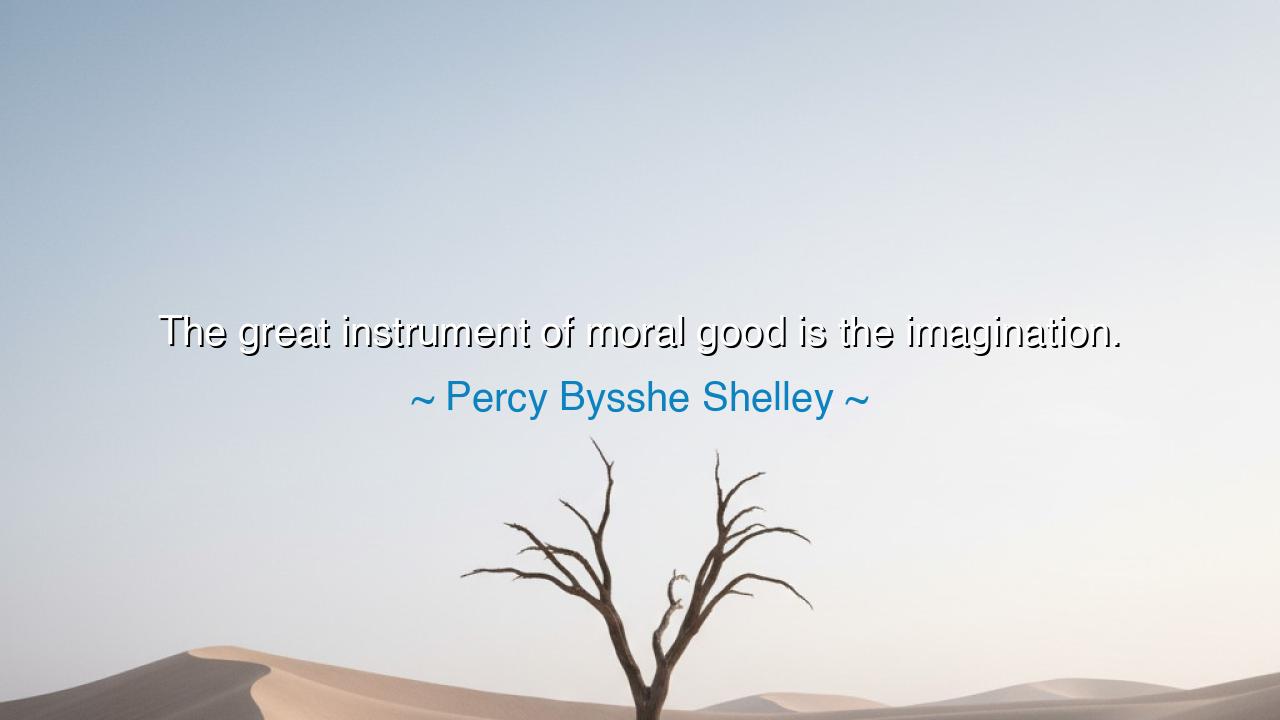
The great instrument of moral good is the imagination.






“The great instrument of moral good is the imagination.” So spoke Percy Bysshe Shelley, the poet who saw beyond the veil of the visible world and into the luminous realm of human spirit. His words rise like a dawn over the dark plains of ignorance, declaring that imagination is not mere fancy, not a flight from reality—but the sacred power through which humanity perceives goodness, compassion, and truth. To Shelley, the imagination was the bridge between the heart and the world, between what is and what ought to be. It was, he believed, the divine faculty by which mortals might touch the eternal and transform cruelty into kindness, despair into hope, chaos into beauty.
In the ancient times, philosophers and poets alike spoke of a fire that dwells within man—a creative flame that mirrors the light of the gods. The Greeks named it phronesis, the wisdom of moral insight, born not of reason alone but of vision—the ability to see into the soul of another. For reason instructs us what is lawful, but imagination teaches us what is just. When one man suffers, it is imagination that allows another to feel that pain as his own; and from that feeling, moral good is born. Shelley saw that this power, this empathy of the mind’s eye, is the root of every noble act, every act of mercy that lifts humanity from barbarism toward enlightenment.
Consider the story of Florence Nightingale, who walked into the blood-soaked tents of the Crimean War. It was not wealth nor command that moved her—it was imagination, the inner sight that allowed her to see beyond statistics and uniforms, to see men not as soldiers, but as suffering souls. Through that vision, she wrought a revolution in healing, in dignity, in compassion. She did not merely apply skill; she imagined a better world, and then built it with her own trembling hands. Thus, imagination became the instrument of moral good—not by creating illusions, but by envisioning truth more deeply than logic alone could reach.
For imagination is the mirror of the heart. When we imagine the sorrow of another, we awaken the sleeping virtue within ourselves. Without it, laws are hollow, rituals are empty, and goodness becomes a lifeless word. The tyrant lacks imagination; he cannot feel the pain of those he oppresses. The indifferent lack imagination; they cannot picture the consequence of their inaction. But the just, the merciful, the visionary—they all see what others cannot. They feel the invisible, and act upon that sacred sight.
Shelley himself lived in an age of upheaval and injustice. He saw tyranny cloaked in religion, poverty festering beneath splendor, and the human soul crushed by dogma. Yet he did not respond with weapons or decrees—he responded with imagination. His poetry burned with a moral fire that sought to awaken others to love, freedom, and empathy. In his hands, imagination became a moral weapon, sharper than any sword, capable of changing the hearts of men long after their empires turned to dust. For he knew that every great reform, every step toward justice, begins not in the halls of power but in the chambers of the human mind, where one dares to imagine a kinder world.
O children of tomorrow, remember this teaching: imagination is not to be confined to art or dream—it is the breath of virtue itself. To imagine another’s pain is to begin the work of compassion. To imagine a better society is to take the first step toward building it. To imagine beauty in what others deem broken is to practice redemption. Train this sacred faculty as you would train the body; nourish it with stories, with silence, with wonder. For a dull imagination is a dull conscience, and a bright imagination is a blazing heart.
Thus, let this truth be written upon your spirit: The imagination is the seed of moral good. Guard it, nurture it, use it. When you see cruelty, imagine mercy. When you witness despair, imagine hope. When the world is cold and divided, imagine love strong enough to unite it. For in imagining goodness, you begin to create it—and in creating it, you become its living vessel. And so, by the power of your imagination, you fulfill the highest command of the ages: to be the light that others follow through the dark.






AAdministratorAdministrator
Welcome, honored guests. Please leave a comment, we will respond soon